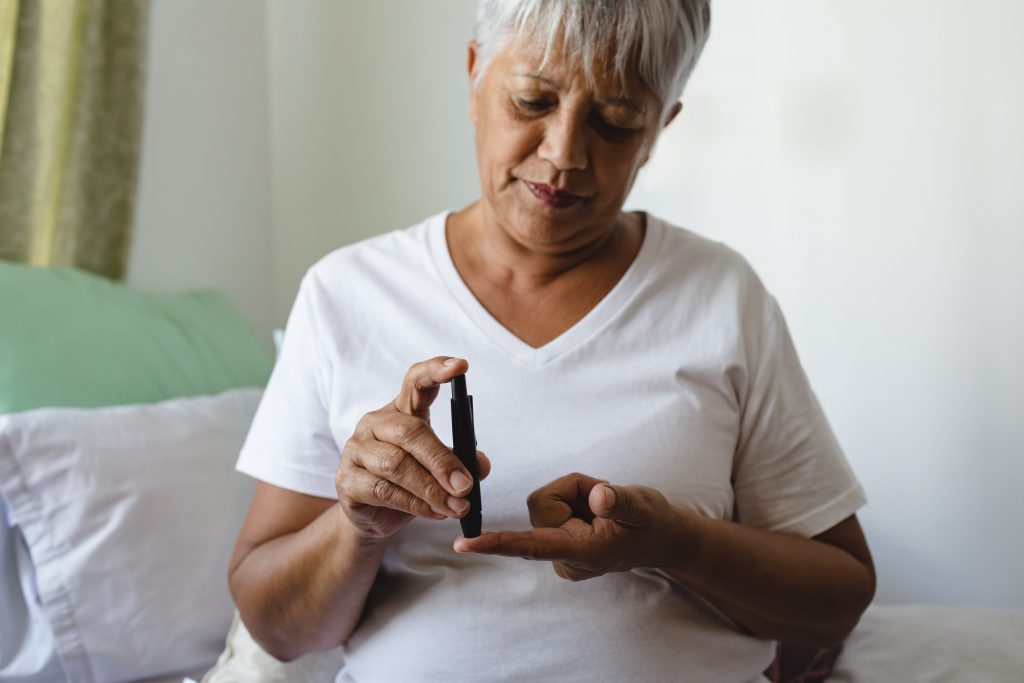What does race have to do with Diabetes? Well, there are numerous factors that put an individual at risk. Some, like exercise and nutrition, are controllable. Therefore, a conscious change in these factors can reduce the risk of developing Diabetes. It can even significantly improve life with the condition.
Some other risk factors like age, family history, or race/ethnic background are things that you have no control over, but may put you at risk.
So again, what does Race have to do with Diabetes?

According to self-reported data, Black Canadians are 6.6 times more likely to get Diabetes than White Canadians. The Canadian Journal of Diabetes reasons that many minority populations, including Indigenous, Asian and Black ethnicities, are genetically predisposed to the disease. However, some studies have shown that socio-economic factors could also be to blame.
Systemic inequalities; like income and a lack of ethnically specific medical research in Canada; could be reasons why minority groups suffer from this condition at a greater rate. An article from CBC states that some factors; such as higher rates of poverty, lived experiences of racism, and distrust of the medical system; could be contributing factors.

This makes sense if we simply look at the cost of healthy food versus that of sugary and processed foods. A low-income family might not be able to afford the sort of diet that prevents the development of Diabetes.
Additionally, the change in diet required for a person of African descent may be a lot more drastic than for a person with a more Eurocentric diet.
The bigger question we should be asking here is: ‘What does race have to do with medicine as a whole?’
Managing Diabetes becomes exceedingly more difficult if your doctor does not understand what your own human experience is like. Diabetes care, at its best, should be personal and specific to the patient’s experience.
Black Canadians are 6 times more likely to get Diabetes than white Canadians. But only a small percentage of doctors in Canada are black.
With growing reports of racism in medical care, the sad truth is that in many cases, Black Canadians may not be getting the full medical care they require. Especially those with chronic illnesses like Diabetes.

Black Canadians With Diabetes Need Better Support
There is an increasing need for black representation in medicine.

We might look to medical school to understand one cause of the lack of representation. First of all, Medical schools in Canada are notoriously difficult to gain admission into.
A student who wants to get into Canadian medical schools faces a very high bar. For instance, they must have a 4.0 GPA, reputable references, and pass the intense 7-hour MCAT exam. They must also present extracurricular activities that they volunteered for in a leadership capacity. It also doesn’t hurt to have one or two scholarly publications under your belt.
It may be true that this is for the purpose of a more holistic selection process. However, it might prove difficult for an African immigrant student, for instance, who needs time to work to pay rent. Many have no family home to live in, and no wealth to fall back on. An aspiring student in this case finds themselves working and studying at the same time. They may not have the luxury of time to participate in solid extracurricular activities, while balancing getting a 4.0 GPA, going to work, and studying for the MCAT’s.
But do these factors truly affect the number of black doctors we are producing in Canada?
Black Medical Students Association of Canada (BMSAC) conducted a survey in 2020. It found that the number of Black medical students in Canada between years 1 and 4, was just 160 out of nearly 12000 students.
Additionally, in 2016 The University of Toronto had 1 black medical student out of 259. In 2020, they upped that number to 24, making it a record number in Canadian medical school history.
Black representation is falling through the cracks of the medical world
There is lack of data collected on representation and medicine in Canada, and frankly, it’s concerning.
“One of the biggest problems in Canadian medicine is a lack of useful demographic data collection that includes race, to enable us to get a good grasp on the issues we are trying to fix.
When it comes to a lack of representation, there needs to be iterative data collection aimed at highlighting the bottlenecks along the medical school admissions path. Unfortunately, this sort of data is not collected nationally and to date there are no definitive statistics around the number of Black medical students, trainees or physicians in Canada.”
– Gbolahan Olarewaju (Chair of the BMSCA)
We cannot fix a problem that has not yet been properly documented
So where does that leave us? One ray of hope we have comes in the form of the Black Medical Students Association of Canada (BMSAC).

Established in 2020, it is the first of its kind in Canadian history. They have wasted no time in beginning to collate the data that we are missing. It is made up of black medical students from all across Canada, who jointly recognized the problem and have chosen to work to solve it. The organization is led by Gbolahan Olarewaju, a second-year, Nigerian-Canadian medical student at UBC.
Our mission is to secure the equitable representation of Black students in Canadian medical schools, and advocate for a more inclusive medical training that equips all learners to better serve the healthcare needs of underserved Black communities across Canada.
What we need from everyone in and outside the medical community is a recognition of the issues we are raising, and a continual commitment to engage with these issues as we work to dismantle the racist systems that put us in this predicament.”
– Gbolahan Olarewaju (Chair of the BMSCA)
The BMSAC has begun advocating for a better medical system in Canada. One that acknowledges where it may have failed black Canadians and takes steps to shape a better future.
Maybe in this future, Black Canadians will get the medical representation that they need.

About 360Care
360Care by Ellerca Health seeks to empower individuals to regain control of their health. We believe that with the right support and motivation, anyone can make and maintain the lifestyle changes necessary to live a happy and healthy life.
By using 360Care through your mobile device, you’ll have access to a team of health professionals (nurses, dieticians, diabetes educators, psychologists, and coaches) and your own personalized health plan, all dedicated to helping you reach your health goals.
From feeling better, relieving symptoms, and improving your quality of life, 360Care can help you to live your best life.











